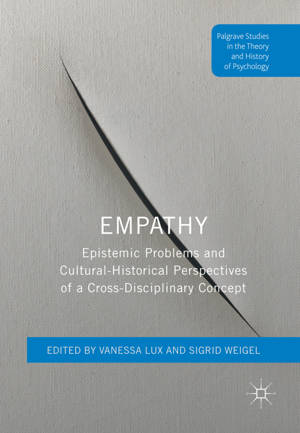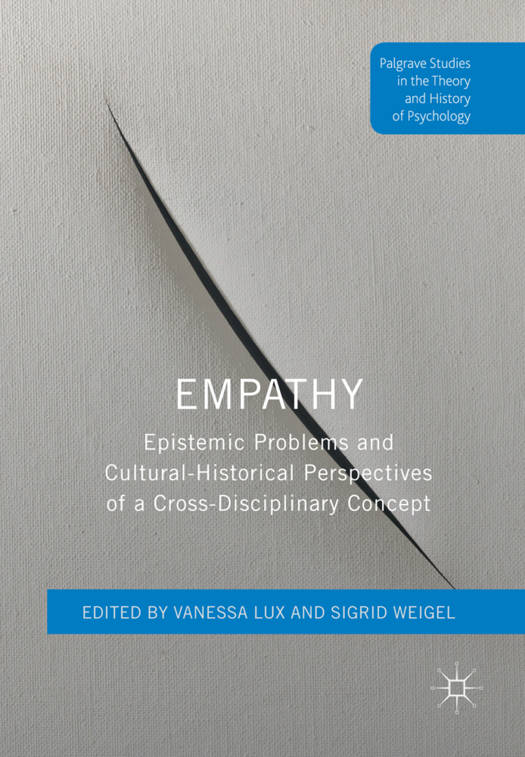
Door een staking bij bpost kan je online bestelling op dit moment iets langer onderweg zijn dan voorzien. Dringend iets nodig? Onze winkels ontvangen jou met open armen!
- Afhalen na 1 uur in een winkel met voorraad
- Gratis thuislevering in België vanaf € 30
- Ruim aanbod met 7 miljoen producten
Door een staking bij bpost kan je online bestelling op dit moment iets langer onderweg zijn dan voorzien. Dringend iets nodig? Onze winkels ontvangen jou met open armen!
- Afhalen na 1 uur in een winkel met voorraad
- Gratis thuislevering in België vanaf € 30
- Ruim aanbod met 7 miljoen producten
Zoeken
Empathy
Epistemic Problems and Cultural-Historical Perspectives of a Cross-Disciplinary Concept
€ 122,45
+ 244 punten
Omschrijving
This book digs into the complex archaeology of empathy illuminating controversies, epistemic problems and unanswered questions encapsulated within its cross-disciplinary history.
The authors ask how a neutral innate capacity to directly understand the actions and feelings of others becomes charged with emotion and moral values associated with altruism or caregiving. They explore how the discovery of the mirror neuron system and its interpretation as the neurobiological basis of empathy has stimulated such an enormous body of research and how in a number of these studies, the moral values and social attitudes underlying empathy in human perception and action are conceptualized as universal traits. It is argued that in the humanities the historical, cultural and scientific genealogies of empathy and its forerunners, such as Einfühlung, have been shown to depend on historical preconditions, cultural procedures, and symbolic systems of production.
The multiple semantics of empathy and related concepts are discussed in the context of their cultural and historical foundations, raising questions about these cross-disciplinary constellations. This volume will be of interest to scholars of psychology, art history, cultural research, history of science, literary studies, neuroscience, philosophy and psychoanalysis.
The authors ask how a neutral innate capacity to directly understand the actions and feelings of others becomes charged with emotion and moral values associated with altruism or caregiving. They explore how the discovery of the mirror neuron system and its interpretation as the neurobiological basis of empathy has stimulated such an enormous body of research and how in a number of these studies, the moral values and social attitudes underlying empathy in human perception and action are conceptualized as universal traits. It is argued that in the humanities the historical, cultural and scientific genealogies of empathy and its forerunners, such as Einfühlung, have been shown to depend on historical preconditions, cultural procedures, and symbolic systems of production.
The multiple semantics of empathy and related concepts are discussed in the context of their cultural and historical foundations, raising questions about these cross-disciplinary constellations. This volume will be of interest to scholars of psychology, art history, cultural research, history of science, literary studies, neuroscience, philosophy and psychoanalysis.
Specificaties
Betrokkenen
- Uitgeverij:
Inhoud
- Aantal bladzijden:
- 325
- Taal:
- Engels
- Reeks:
Eigenschappen
- Productcode (EAN):
- 9781349702688
- Verschijningsdatum:
- 15/04/2021
- Uitvoering:
- Paperback
- Formaat:
- Trade paperback (VS)
- Afmetingen:
- 148 mm x 210 mm
- Gewicht:
- 399 g

Alleen bij Standaard Boekhandel
+ 244 punten op je klantenkaart van Standaard Boekhandel
Beoordelingen
We publiceren alleen reviews die voldoen aan de voorwaarden voor reviews. Bekijk onze voorwaarden voor reviews.










